When using a VPN, the number one priority should always be privacy and security. After all, this is – or should be – the most important function of this service. However, many providers that claim to be safe are unsafe and some of them are known for storing logs.
This negatively impacts your privacy and leaves you exposed to third parties that use your personal data to earn money and employ targeted ads. Today, I want to talk about TunnelBear, a reputable free VPN provider that promises exactly what I said.
Of course, this brings up the question – Is TunnelBear safe and secure? Is TunnelBear safe to use or is it just another free provider with false promises and nothing good to offer? I know you have plenty of questions but they’ll be answered in this analysis.
During this analysis, I’ll talk about its in-app security features, check its privacy policy, do a couple of DNS/IP leak tests, and give you a proper conclusion and answer to the question, is TunnelBear safe and secure? Without further ado, let’s get into it and see what this service has to offer security-wise.
Is TunnelBear Safe to Use? Security Features Examined
When you subscribe to a VPN provider, the first contact with it comes with the application. Therefore, we’ll first analyze the security features you get in TunnelBear’s applications and see which active and passive security features you can expect.
256-bit AES Encryption
Starting with encryption, much like any other provider, TunnelBear uses well-known AES-256 or 256-bit AES encryption, as some people call it. Many people call it bank-grade encryption or military-grade encryption and there’s a good reason for that.
Namely, this encryption is impenetrable by brute force or any other advanced hacking techniques. It is used by banks and the military worldwide for securing confidential data, which speaks volumes about how safe and secure it is.
If you use TunnelBear – even its free plan – you get this level of encryption as standard, which is, so far, quite good to know. Also, this encryption is used in conjunction with all of the available protocols so that you aren’t compromising on security based on your protocol selection.
VigilantBear
TunnelBear loves using fancy names for its features to honor the bear – the company’s mascot. Thus, a feature called VigilantBear is actually an automatic kill switch. This feature blocks your internet traffic while the VPN reconnects, which is useful for preserving your privacy.
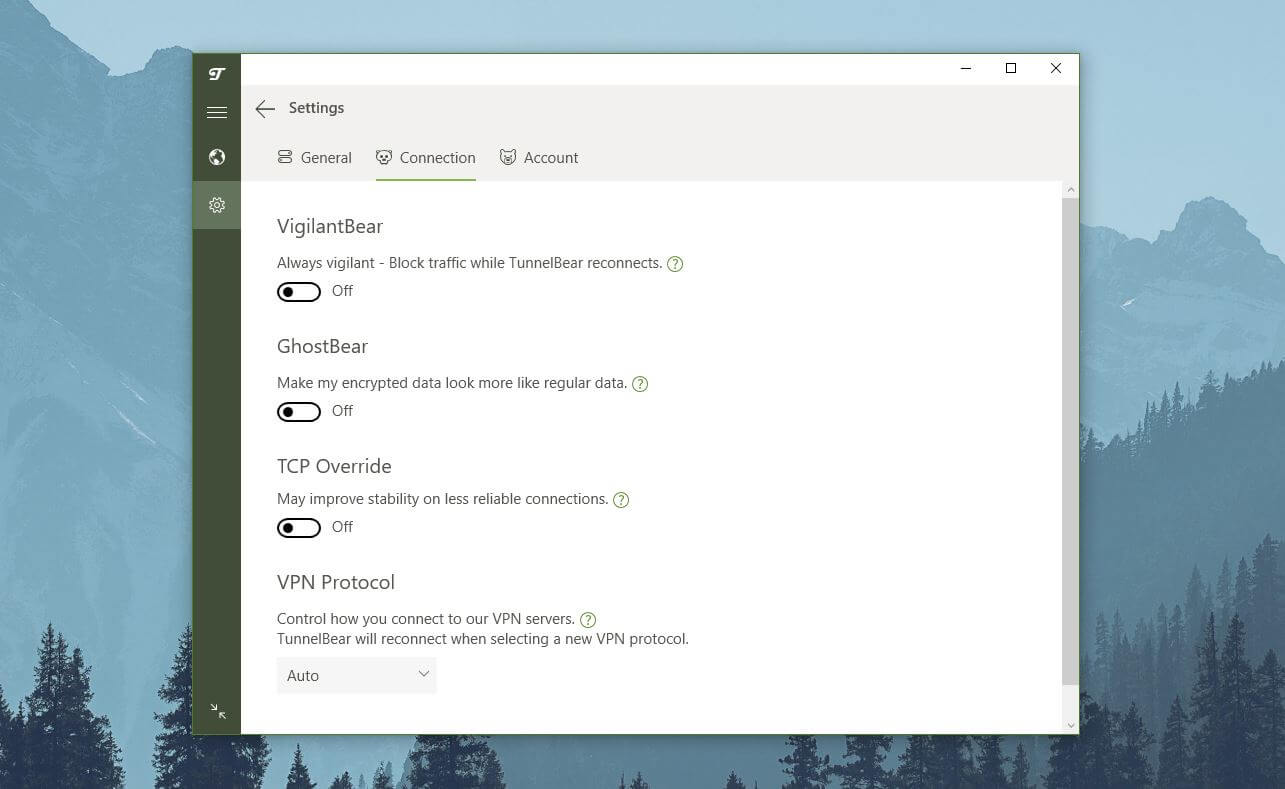
If you lose the VPN connection accidentally, VigilantBear springs into action, blocks your internet traffic, and prevents your IP and DNS addresses from leaking to the public. This leaves you without the means of going online but at least you remain anonymous when connection issues appear.
I tested this feature a few times “accidentally” when the server was down for maintenance, and in typical fashion, VigilantBear worked with no issues, disabling my internet connection as soon as my VPN connection snapped.
GhostBear
GhostBear is a feature for bypassing censorship. In my TunnelBear review, I talked more about it and expressed how glad I am to have such a feature in a free VPN. It works by making your VPN traffic look like ordinary traffic, which helps bypass firewalls and circumvent censorship in some countries.
Now, we should point out that our testers in China had no luck with this provider as it couldn’t bypass the Great Firewall. It will, however, work if you need to unblock websites at school or the workplace or use it in a lightly censored country like Russia or the UAE.
WireGuard Support
Is TunnelBear safe and secure? Well, it most definitely is in terms of features, despite having only basic functionalities with the addition of GhostBear. However, to make things better, the provider includes a solid selection of VPN protocols.
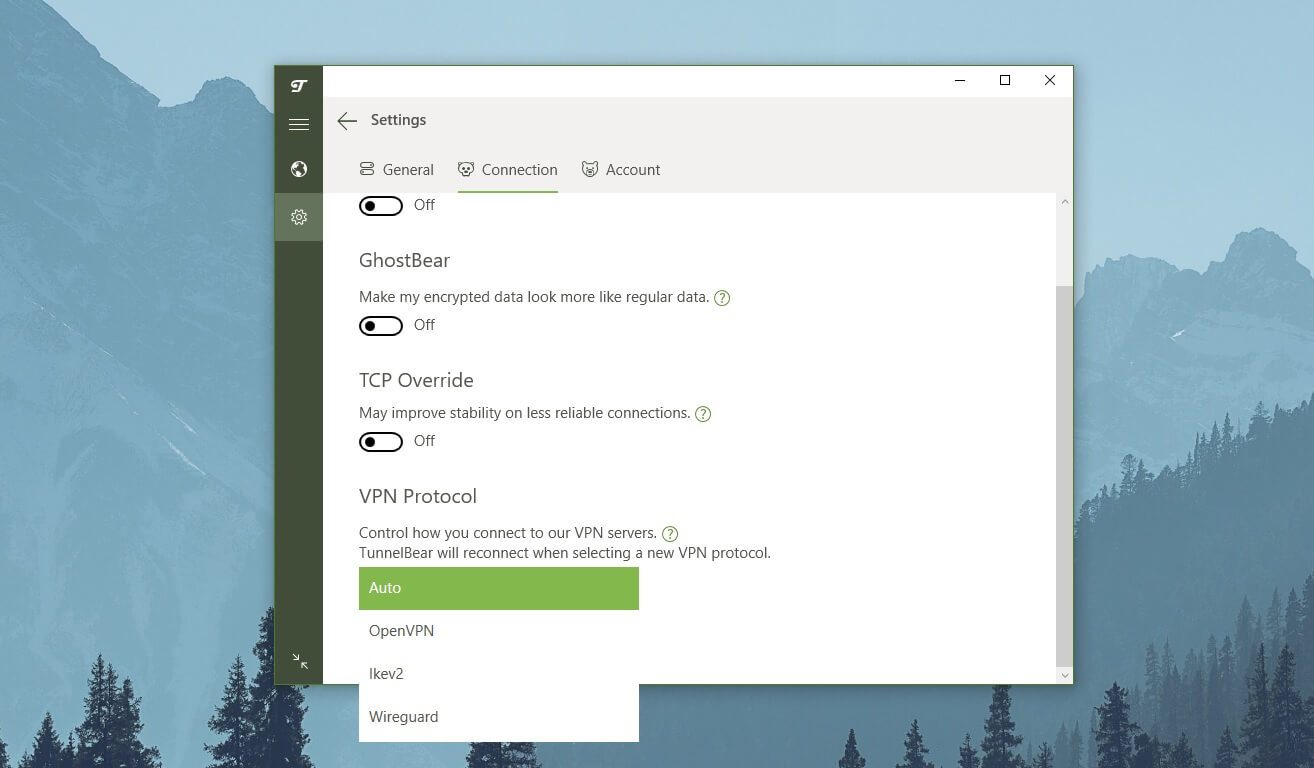
As you can see, it supports WireGuard in its free plan but there’s OpenVPN and its alternative IKEv2. These protocols are offered by CyberGhost as well, for instance, so the provider made sure to offer premium protocols regardless of the fact that it’s free.
WireGuard improves speeds, connection stability, and security, while OpenVPN and IKEv2 provide a balance between performance and security. Also, OpenVPN is more likely to bypass censorship, which is why you should use it if you encounter firewall restrictions.
Does TunnelBear Store Logs? Analysis of Its Privacy Policy & Jurisdiction
The question “Is TunnelBear safe and secure?” remains because we haven’t talked about its logging practices and jurisdiction. For me, logging practices are very important, if not THE most important part of a VPN service. If a provider stores logs, it’s immediately discarded, and if not… well, there are still chances I’d recommend it to my readers.
Where Is TunnelBear Based?
If we take a look at TunnelBear’s jurisdiction, things aren’t as bright as you might expect. The company is based in Canada, which immediately rings the bell in my head, saying “5 Eyes!” Countries from the 5 Eyes alliance include the UK, the US, Australia, New Zealand, and Canada.
These countries are notorious for extreme government surveillance and mass data collection through ISPs, which puts people’s privacy in jeopardy, as the authorities know every step they make online. This makes it increasingly difficult for providers in such countries to maintain a no-logging policy.
Take HideMyAss VPN as an example. It’s a British provider with a history of cooperating with the FBI by supplying connection logs in one criminal case. The same happened with IPVanish, a US-based company, and we can go on and on.
Is TunnelBear Safe in Terms of Logging Practices?
TunnelBear is different, though. This provider exists for quite some time and I remember LinusTechTips on YouTube constantly advertising it as a no-log service of exceptional quality. While its quality is questionable, the provider is indeed a no-log company!

Taking a look at the privacy policy, the provider stores no logs of your IP addresses, DNS queries, websites you visit, applications you use, and so forth. I like that it doesn’t log the IP address visiting its site PLUS the IP address supplied by the VPN.
The information that TunnelBear stores are minuscule and we’re talking about only necessary information for the service to function. There’s information like OS version, TunnelBear app version, and operational events for troubleshooting purposes.
This provider stores the amount of bandwidth you used but this is for free users who have limited bandwidth of 500 MB a month. Finally, the provider will store info about your monthly activity in binary form, marking it with 1 if you were active and 0 if you weren’t active during a particular month.
Third-Party Audits
TunnelBear crowns its security and privacy claims with a third-party audit from Cure53. If you remember, Cure53 also performed an independent audit on Surfshark, one of the best VPN providers on the market.
Cure53 conducted an audit on TunnelBear, spending 47 days examining the provider thoroughly, looking for vulnerabilities and issues within its network. In 2021, they found four low-risk, nine medium-risk, and three high-risk and critical-risk vulnerabilities.
This may sound alarming, but TunnelBear came out with this information openly and even managed to fix most of the issues after the audit took place. Thus, in 2025, we can safely say that the provider removed its vulnerabilities and fixed the problems, making it much more trustworthy.
IP & DNS Leak Tests: Let’s See if There’re Any Leaks
Are you still wondering if TunnelBear VPN is safe and secure? I think there’s only one way left to answer your question. I must perform a few IP and DNS leak tests to see if the provider has any leaks, which are extremely dangerous to your privacy.
For this purpose, I use a website by the name of ipleak.net where I connect to several server locations and check if my original IP and DNS addresses are displayed. Speaking of them, my test without using a VPN produces these results – IP/DNS addresses are hidden for obvious reasons.
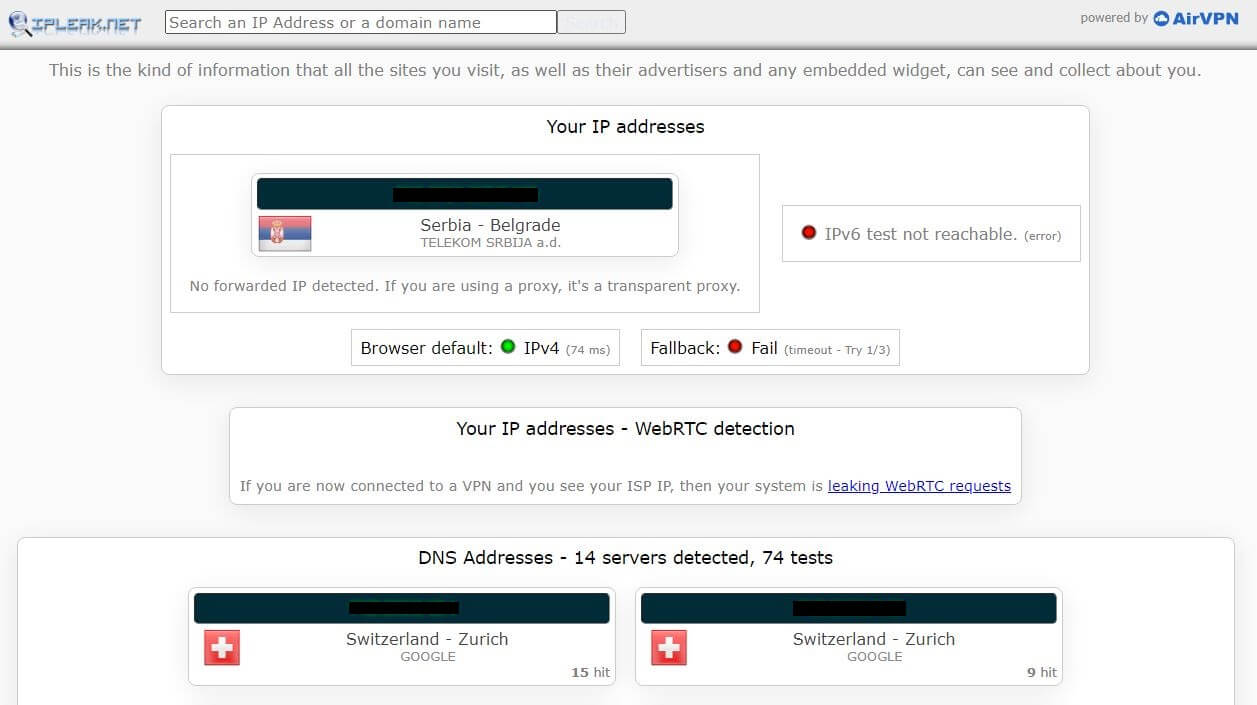
To test TunnelBear, I’ll connect to three server locations such as the US, Canada, and Japan. The first IP leak test with a US IP address and as you can see, the provider displays no leaks.
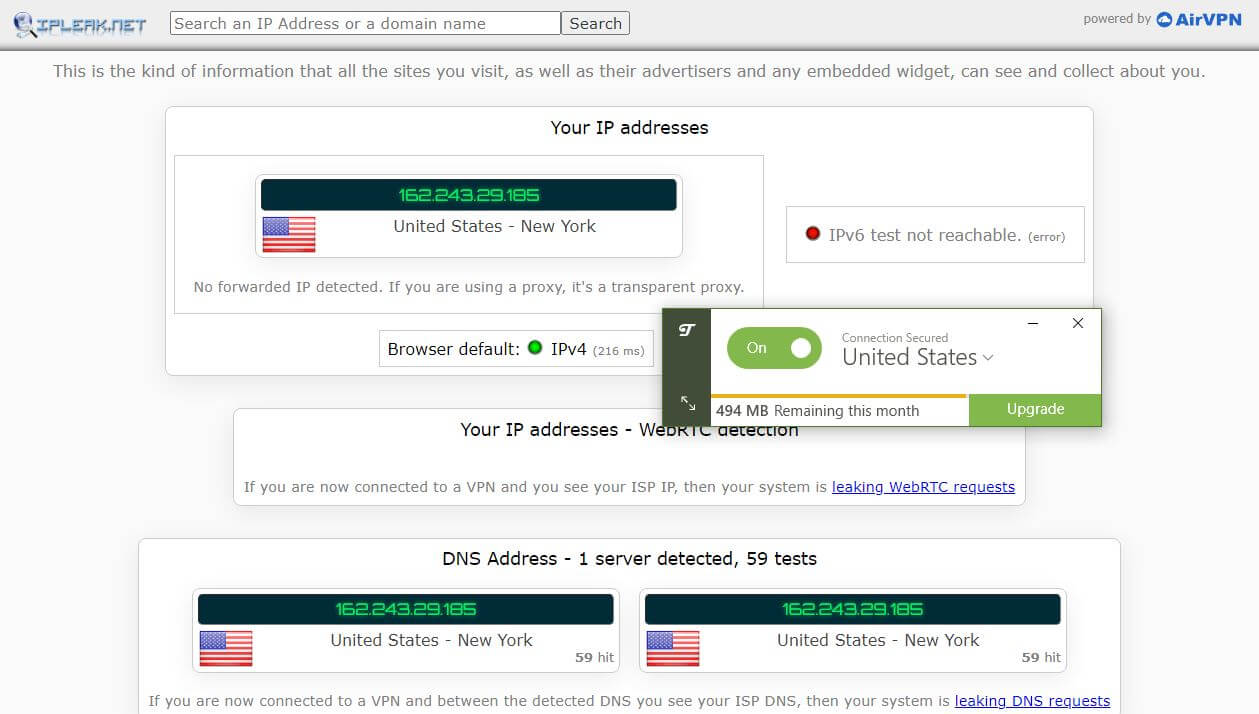
Moving on, I connected to the Canadian server, and with the Canadian IP in place, I refreshed the page to check for leaks. Once again, the results were phenomenal, with no leaks of my IP and DNS addresses.
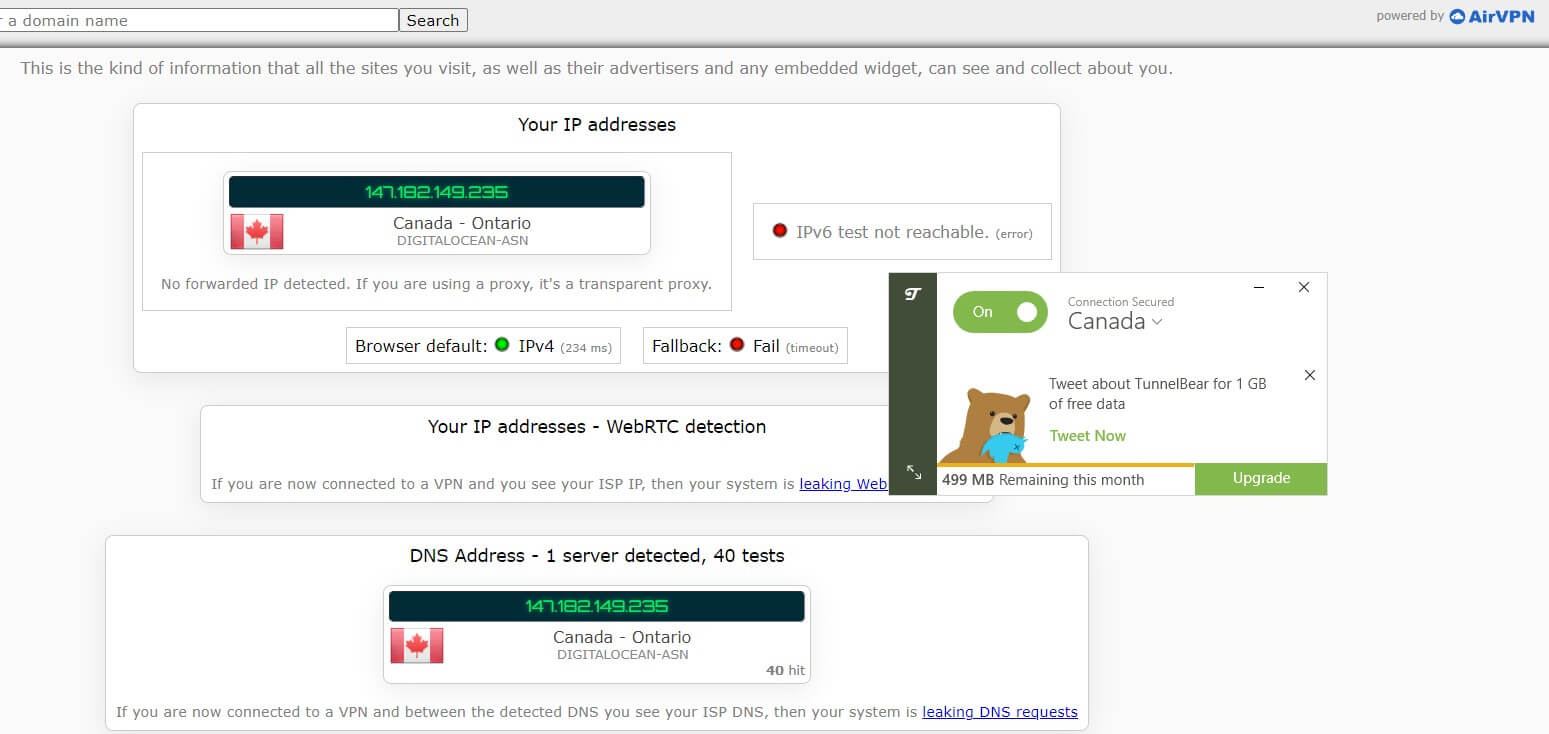
The last test I did was with the Japanese server and in the screenshot below, you can see the results clearly.
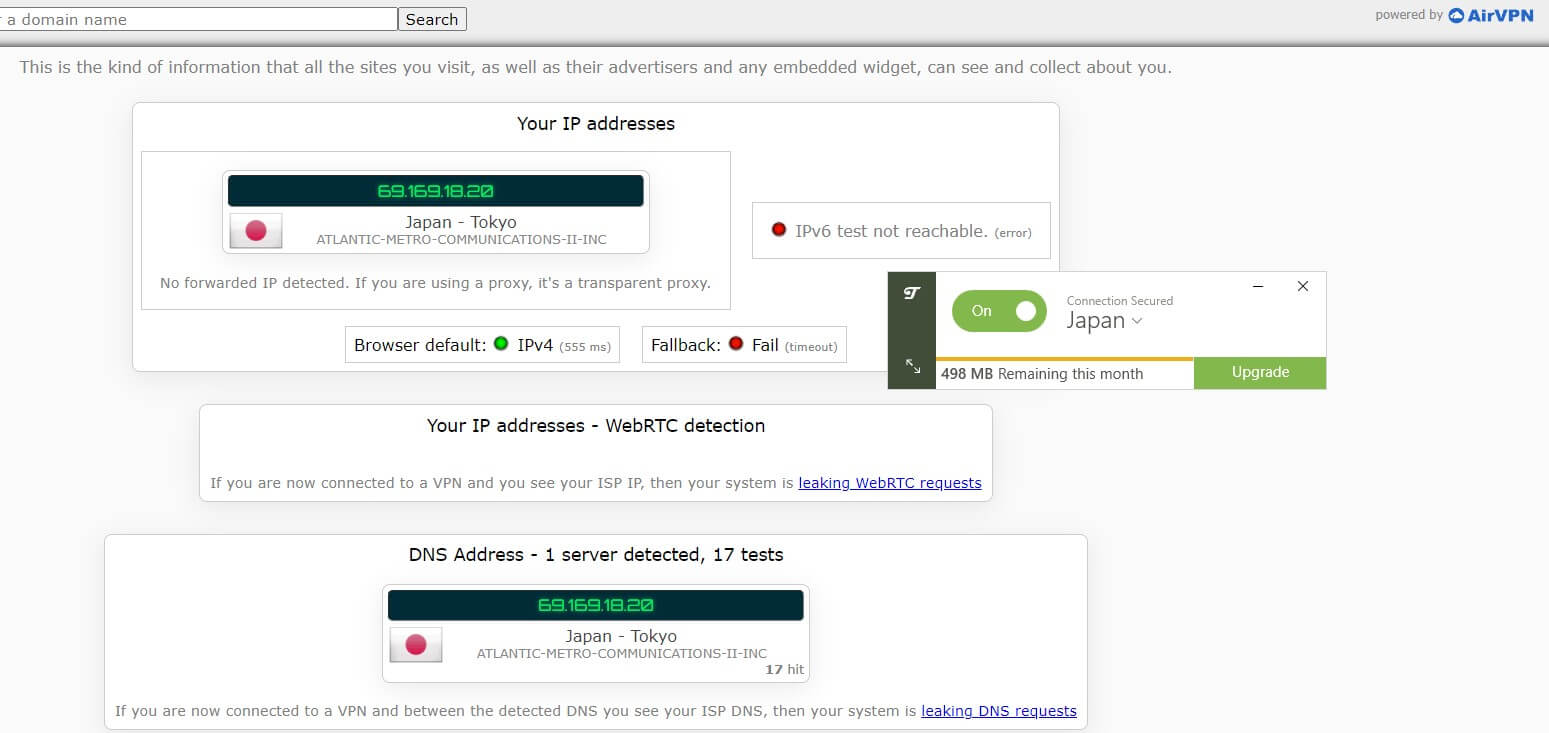
TunnelBear once again impresses me by not showing any leaks and keeping my online whereabouts safe and secure.
So Is TunnelBear Safe to Use?
Okay, so now, it’s time to conclude this test and answer the question: is TunnelBear safe and secure? The answer is obviously YES, as the provider has excellent security features, a certified no-logging policy, and no IP/DNS leaks that could compromise your privacy.
If you need a free provider for online privacy, this is a good option if we exclude its 500 MB monthly bandwidth limit. Only because of this annoyance, I recommend seeking TunnelBear alternatives and finding a provider with either more bandwidth or no bandwidth limits.
If you’re going for a premium provider, my recommendation is ExpressVPN and its 49% discount + 3 free months for the annual plan. This provider is even more secure, yet, it has unlimited bandwidth and better streaming capabilities.
However, if you want to use strictly a free VPN and you don’t want to pay, I’d say Atlas VPN is a better choice. It comes with 5 GB of bandwidth, a no-logs policy with an independent audit, and better performance, making it a far better option.